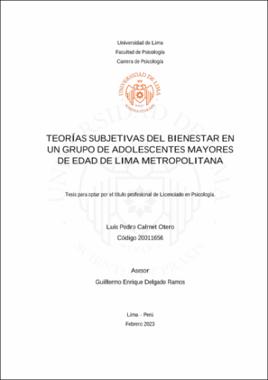Teorías subjetivas del bienestar en un grupo de adolescentes mayores de edad de Lima Metropolitana

View/
Descargar
(application/pdf: 852.5Kb)
(application/pdf: 852.5Kb)
Autorización
(application/pdf: 211.9Kb)
(application/pdf: 211.9Kb)
Reporte de similitud
(application/pdf: 12.60Mb)
(application/pdf: 12.60Mb)
Date
2023Author(s)
Advisor(s)
Metadata
Show full item recordAbstract
The present qualitative research aimed to discuss the subjective theories of a group of
older adolescents in Metropolitan Lima about what a good life means to them and how
to achieve it, by analyzing them with PERMA's scientific theory of human well-being
and flourishing. For this purpose, a group of participants composed of six males and four
females whose average age was twenty-one years old was gathered. In-depth interviews
were conducted with questions related to their definition of happiness and happiness
during pandemics. The most relevant dimensions found in the subjective theories of wellbeing were organized into four thematic axes: pleasurable activities, self-fulfillment,
meaningful experiences and interpersonal bonds. The global event of the COVID-19
pandemic allowed us to observe that the relevant dimensions of well-being, happiness or
human flourishing, prevail even after post-traumatic events such as this health crisis,
evidencing the value of factors such as relationships, the search for fulfillment and
positive emotions. La presente investigación de naturaleza cualitativa tuvo como objetivo discutir las teorías
subjetivas en un grupo de adolescentes mayores de edad de Lima Metropolitana sobre lo
que significa para ellos una buena vida y cómo lograrlo, al analizarlas con la teoría
científica de PERMA sobre el bienestar y el florecimiento humano. Para ello se reunió
un conjunto de participantes compuesto por seis varones y cuatro mujeres cuya edad
promedio fue veintiún años. Se realizaron entrevistas a profundidad con preguntas
relacionadas a su definición de felicidad y felicidad durante pandemia. Las dimensiones
más relevantes encontradas en las teorías subjetivas del bienestar se organizaron en cuatro
ejes temáticos: actividades placenteras, autorrealización, vivencias significativas y
vínculos interpersonales. El evento mundial de la pandemia por el COVID-19 permitió
observar que las dimensiones relevantes del bienestar, felicidad o florecimiento humano,
prevalecen aun después de eventos postraumáticos como dicha crisis sanitaria,
evidenciando el valor de factores como las relaciones, la búsqueda de realización y las
emociones positivas.
How to cite
Calmet Otero, L. P. (2023). Teorías subjetivas del bienestar en un grupo de adolescentes mayores de edad de Lima Metropolitana [Tesis para optar el Título Profesional de Licenciado en Psicología, Universidad de Lima]. Repositorio institucional de la Universidad de Lima. https://hdl.handle.net/20.500.12724/18244Publisher
Universidad de LimaCollections
- Tesis [162]
The following license files are associated with this item:

